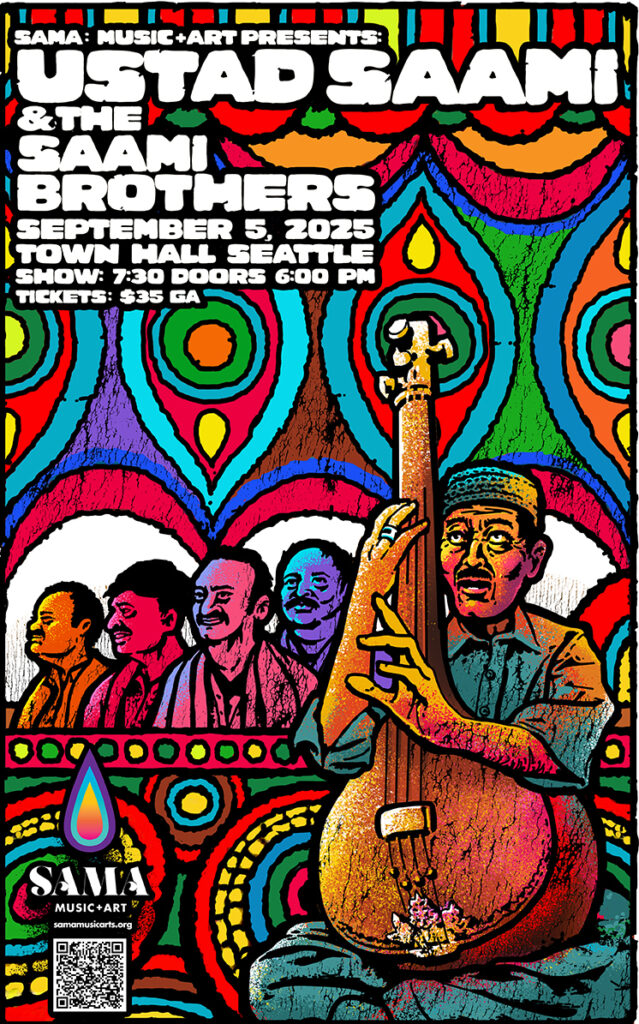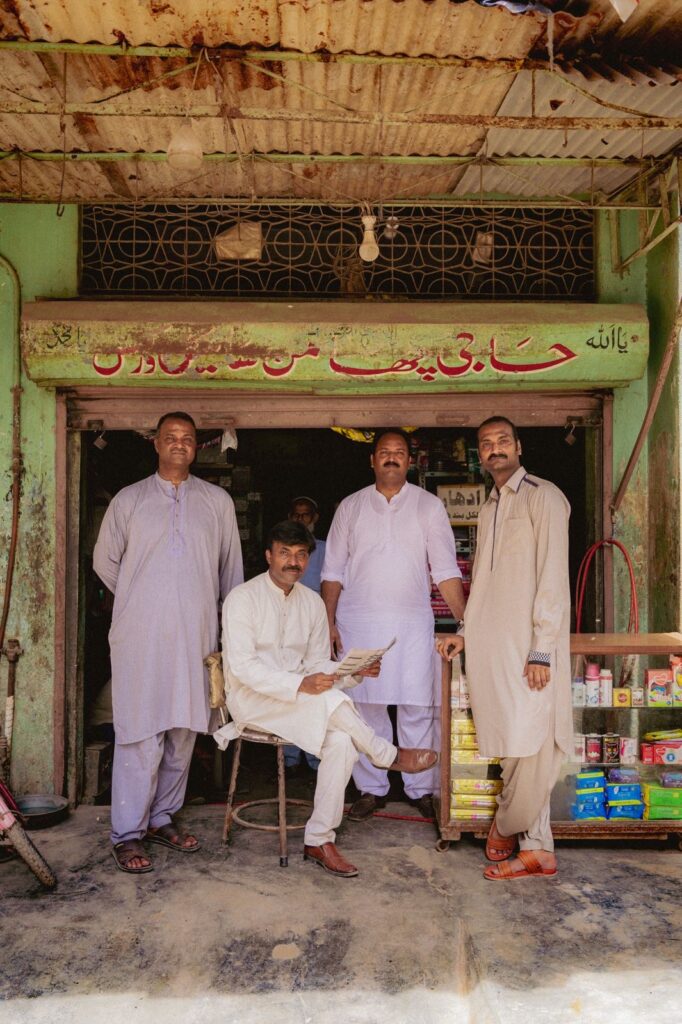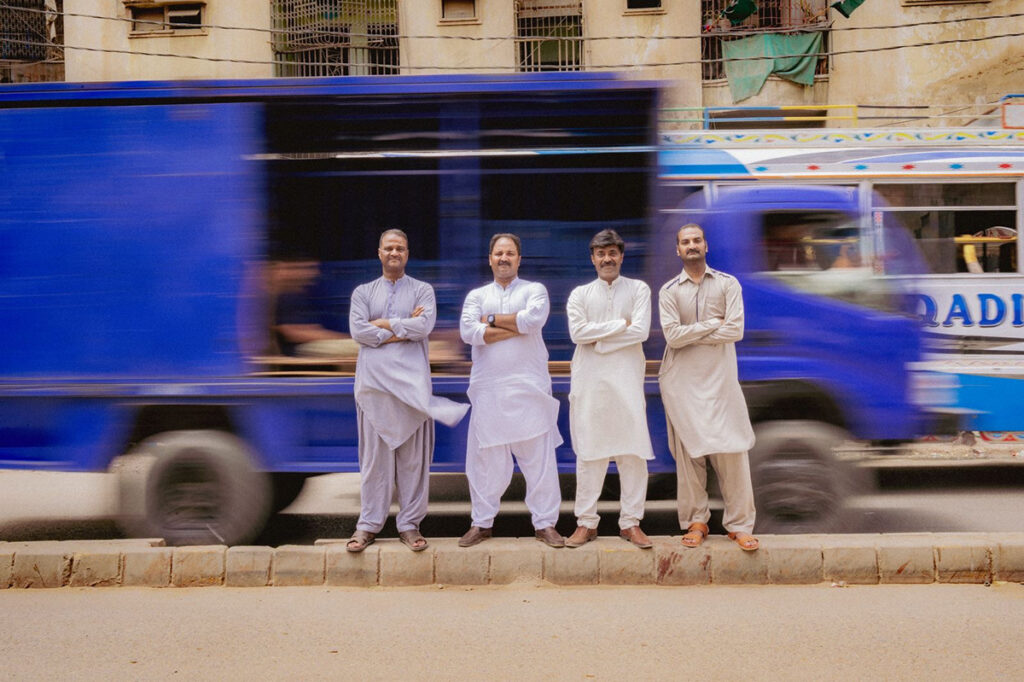By Andrew Hamlin
NORTHWEST ASIAN WEEKLY
 A musical scale with 49 tones—almost five times the 12 tones used in the Western musical scales—would seem daunting to most Westerners. But to Pakistani Rauf Saami, singer with the Saami Brothers, working with such a system became second nature long ago.
A musical scale with 49 tones—almost five times the 12 tones used in the Western musical scales—would seem daunting to most Westerners. But to Pakistani Rauf Saami, singer with the Saami Brothers, working with such a system became second nature long ago.
Saami, performing at Town Hall Seattle on Sept. 5 with his brothers and his father Ustad Saami, plus local tabla player Anil Prasad, explained, “The 49-microtonal scale divides the 12 Western notes into 49 positions, opening space for immense nuance. Around 1,250 years ago, Ibrahim al-Musli of the Abbasid court refined microtonal melodies that later traveled to South Asia through Sufi networks. Among our ancestors was Samat Bin Ibrahim, a principal student of Amir Khusro, who carried these teachings forward. Learning this scale demands patience, listening, and years of guided training before one can begin to teach it.”
Of course, the singer had plenty of that guided training over his own life.

“I first performed at age 9. My father was singing for a patron who insisted I join. I hadn’t yet started formal training, and I was mortified—especially as Ustaad Saami’s son. Nearly a decade later, at 18, after much struggle to gain acceptance from my grandfather as a student and enduring ridicule from family members who thought I had no potential, I was finally permitted to sing at a family gathering. My teachers had taught me to kill the ego and submit to my elders. That night, under the watchful eyes of great masters, I sang with enough conviction to pass the test. It was then I first felt I might truly be meant to sing—a lesson that still guides me before every performance.”
He’s racked up some memorable stories from performing khayal (mostly wordless) and qawwali (based in poetry) around the world.
“At the 2020 WOMAD Festival in Adelaide, Australia, we found ourselves performing amid a colony of over a thousand bats. Their high-frequency chatter was so loud, we could barely hear each other. But when our father began his alaap (the musical introduction to the performance), the bats fell completely silent for 27 minutes. The moment the tabla joined, their chatter returned in full force. It showed me the mysterious power of sound—the human voice influencing even creatures defined by echolocation.
“Another memory is from a performance at a historic haveli (townhouse) in Lahore, [Pakistan]. My father began singing ‘Raag Megh,’ a raga associated with rain. The sky had been cloudless all day, but as he sang, rain began to fall over the haveli. These experiences remind me of the profound interplay between people, nature, and sound.”
Saami says the players (except for Prasad) haven’t visited Seattle before.
“This will be our first time in the Pacific Northwest. In the U.S., we’ve mostly been based in New York, especially the Bronx and Brooklyn, where we’ve enjoyed connecting with young people from many backgrounds seeking depth through music. We are excited to bring our tradition to Seattle, a city with such a rich musical history and diverse immigrant communities. Just as New York has become a second home, we hope Seattle will as well.”
As for their ongoing mission, that’s straightforward.
“We remain deeply committed to preserving khayal and qawwali in a fast-changing world. We believe in the timeless power of this music to connect people across cultures, just as it has for centuries. Our mission is to continue bringing it to new audiences through festivals, residencies to train the next generation, and public talks about the healing power of indigenous musical arts.”
(special thanks to Nermeen Arastu for translation from the Urdu)
Ustad Saami and the Saami Brothers, plus Anil Prasad, play Sept. 5 at Town Hall Seattle, 1119 8th Avenue on Seattle’s First Hill. For prices, showtime, and other information, visit https://townhallseattle.org/event/ustad-naseeruddin-saami-the-saami-brothers.




